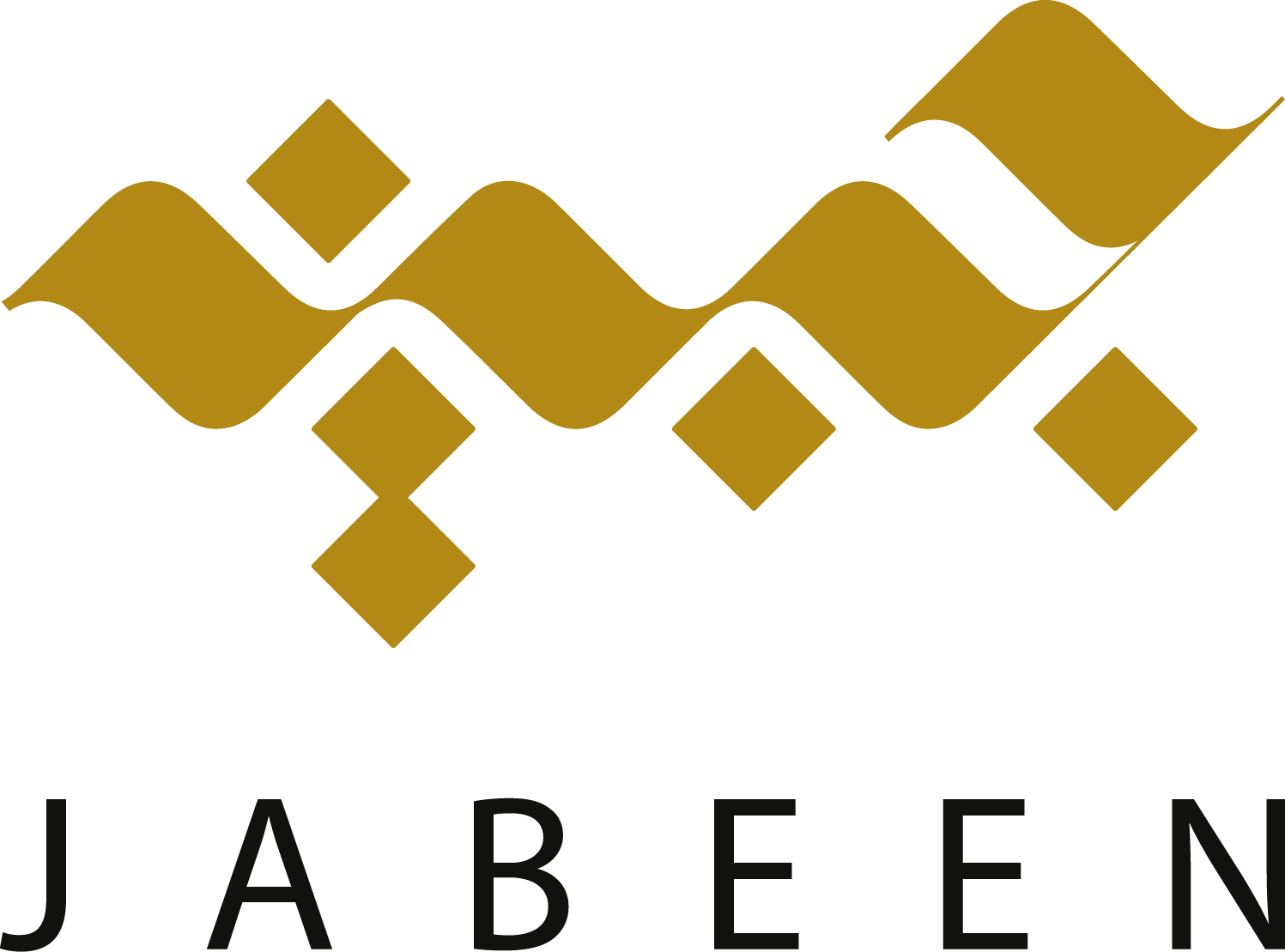Project Scope:
The PlasChem Initiative aims to cluster and link chemical industries to create an integrated industrial chain that adds significant value to the final product. This initiative promotes and develops a cluster focused on the chemical and plastics industries in the Kingdom of Saudi Arabia, making industrial integration a policy. The PlasChem concept contributes to economic growth by maximizing the use of basic petrochemical products, enhancing local content, encouraging new investment opportunities, reducing imports, and increasing the value of Saudi exports, in line with Saudi Vision 2030.
PlasChem is located in Jubail Industrial City, covering an approximate area of 1,555 hectares in Jubail 2, surrounded by major petrochemical companies and consisting of two zones: primary and secondary industries, and light and support industries.
PlasChem enjoys unlimited support from major backers (the Royal Commission for Jubail and Yanbu, major local petrochemical companies, the Ministry of Industry, and the Ministry of Investment). The Royal Commission for Jubail and Yanbu provides support through:
- Providing infrastructure and facilities.
- Easy land allocation process.
- Low rental costs for industrial land.
- Availability of logistics services.
Local petrochemical companies (such as SABIC and Sadara) provide support through:
- Availability of materials
- Ease of access to customers
- Technical Support for Investors
The Ministry of Industry and the Ministry of Investment provide support through:
- Business Establishment and Licensing
- Attracting and Encouraging Investments
- Financial and Non-Financial Incentives
For more information about PlasChem, please visit the PlasChem page for PlasChem.
Added Value:
- Providing comprehensive management of the PlasChem area through a unified service point – preserving resources and facilitating their access to investors
- Optimal utilization of basic products and achieving industrial integration
- Easy access to basic products
- Ease of movement of exports and imports
- Reducing costs
- Creating new investment opportunities
- Increasing non-oil exports
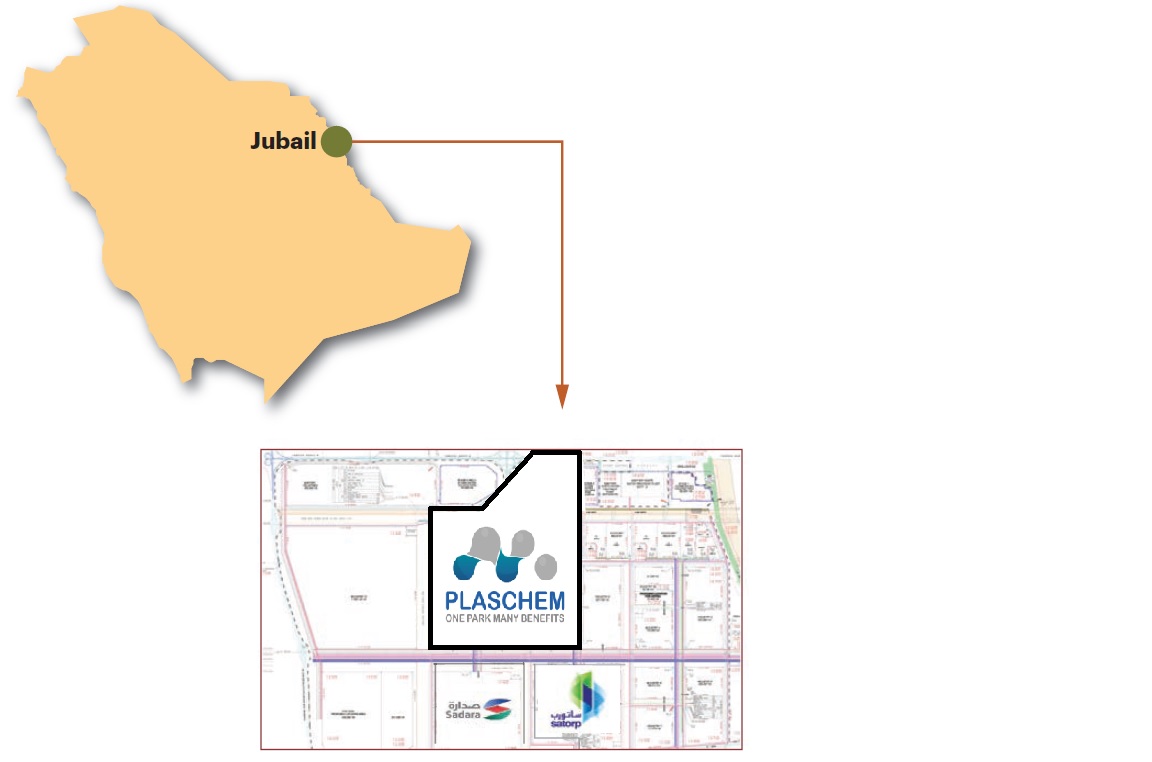
Project Scope:
JABEEN Company provides ready-made factories (ready with services and facilities and ready for operation) with various areas ranging from 1,500 square meters to 2,800 square meters for small and medium-sized companies. The ready-to-use factories feature production workshops, parking lots, loading and unloading areas, and administrative offices. They aim to localize manufacturing and light industries such as films, coatings, and thermoplastics. Ready-to-use factories also offer unique infrastructure, including roads, water, power, telecommunications, sewage, and storm water drainage networks, making them a unique and competitive investment opportunity for entrepreneurs ready to start their businesses in a very short timeframe to market.
Added Value:
- Accelerating industries by establishing ready-made factories using the plug-and-play concept.
- Engaging the private sector to invest in industrial real estate.
- Accelerating industries by establishing workshops.
- Engaging the private sector in responding to market supply and demand requirements.
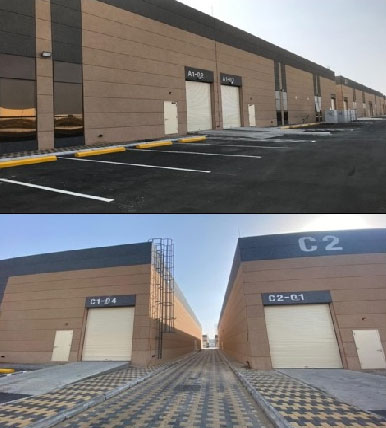
Project Scope:
The Royal Commission for Jubail and Yanbu, as the landowner of the pipeline corridor, has responsibilities for regulatory and safety guidelines, including pipeline corridor asset integrity, engineering, construction, inspection, maintenance, roads, and utilities. Currently, industries using the pipeline corridor space are solely responsible for laying pipes during construction and performing maintenance and inspection tasks in coordination with and with the permission of the Royal Commission for Jubail and Yanbu. Jubail and Yanbu Industrial Cities Services Company, in collaboration with the beneficiary industries in Jubail and Yanbu, is developing a comprehensive plan to establish a new pipeline services company. This will leverage the shared services concept by centralizing inspection and maintenance for the pipeline corridor and any supporting functions required to achieve comprehensive risk management for the pipeline corridor through an appropriate operating model.
Added Value:
- Efficient operations and maintenance and mitigating high risks.
- Providing a sustainable business model for the new Pipeline Services Company.
- Optimizing the utilization of Royal Commission assets for Jubail and Yanbu.
- Minimizing capital investment in pipeline expansion.
- Leveraging the integration of shared services and infrastructure.
- Enhancing the attractiveness of Royal Commission cities.
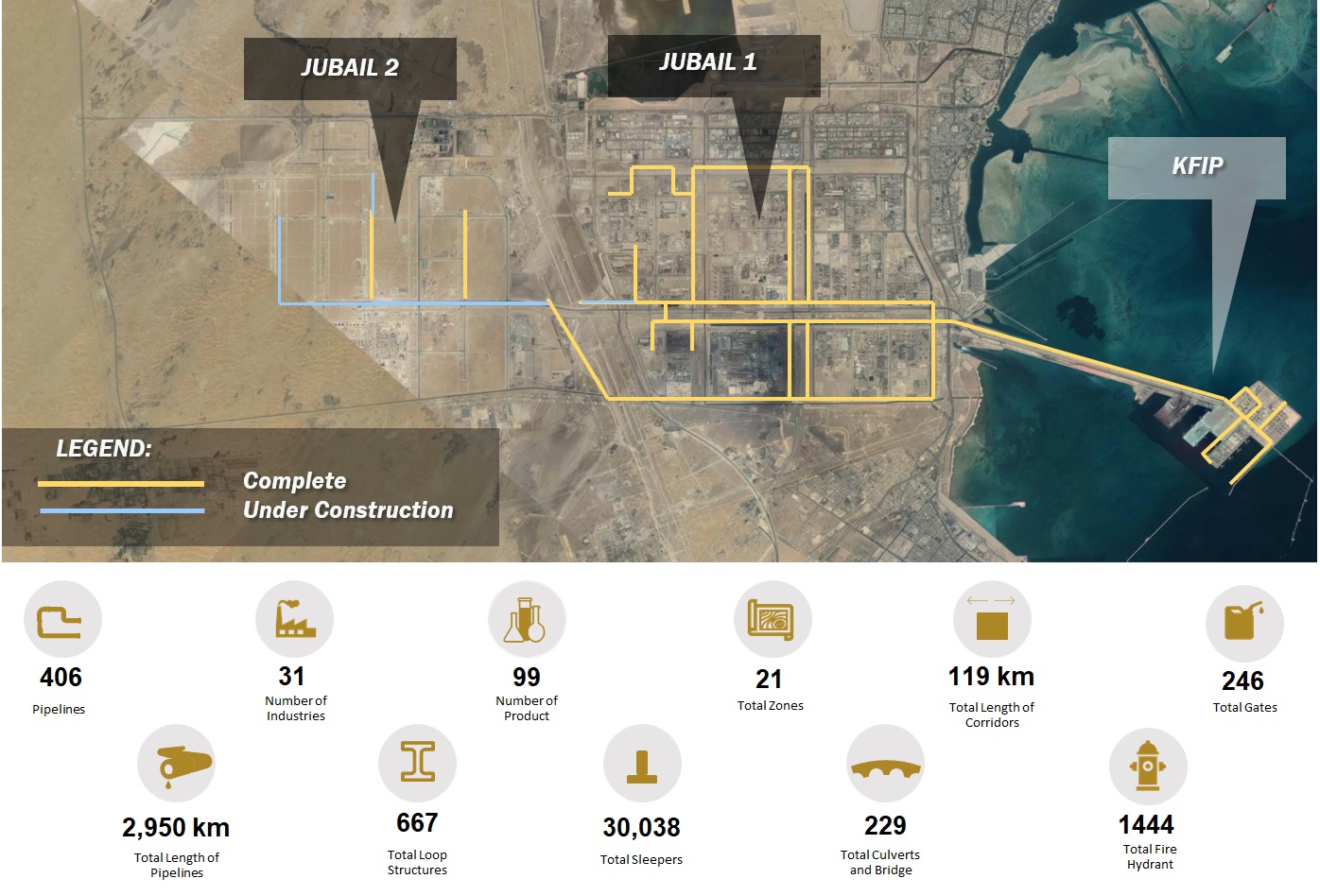
Project Scope:
Located in the PlasChem area, Tahwil (a joint venture between Veolia (80%) and JABEEN (20%)) will process industrial waste and generate steam (a by-product) to meet the needs of the industrial region using the latest technologies and with high environmental compliance. Veolia operates 29 hazardous waste treatment lines worldwide, which will provide unique sustainable waste treatment solutions for companies in the PlasChem area. Veolia’s extensive international experience contributes to achieving Tahwil ‘s goals with high efficiency.
Added Value:
- Supporting industrial waste treatment in Jubail 2 using high-tech technologies.
- Steam production and supply to tenants in the PlasChem area.
- The company will be the service operator for steam and other services.
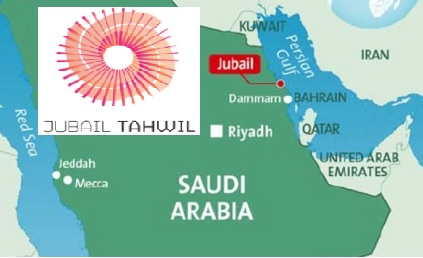
Project Scope:
The Saudi Silk Road Company is a bilateral initiative by the two leaders of KSA and China with the aim of fostering the joint relations and facilitating the Chinese investments flow into Saudi Arabia through the provision of professional marketing, consulting and support to the new investors.
Added Value:
- Maximizing partnership between the two countries.
- Attracting global investment in the region.
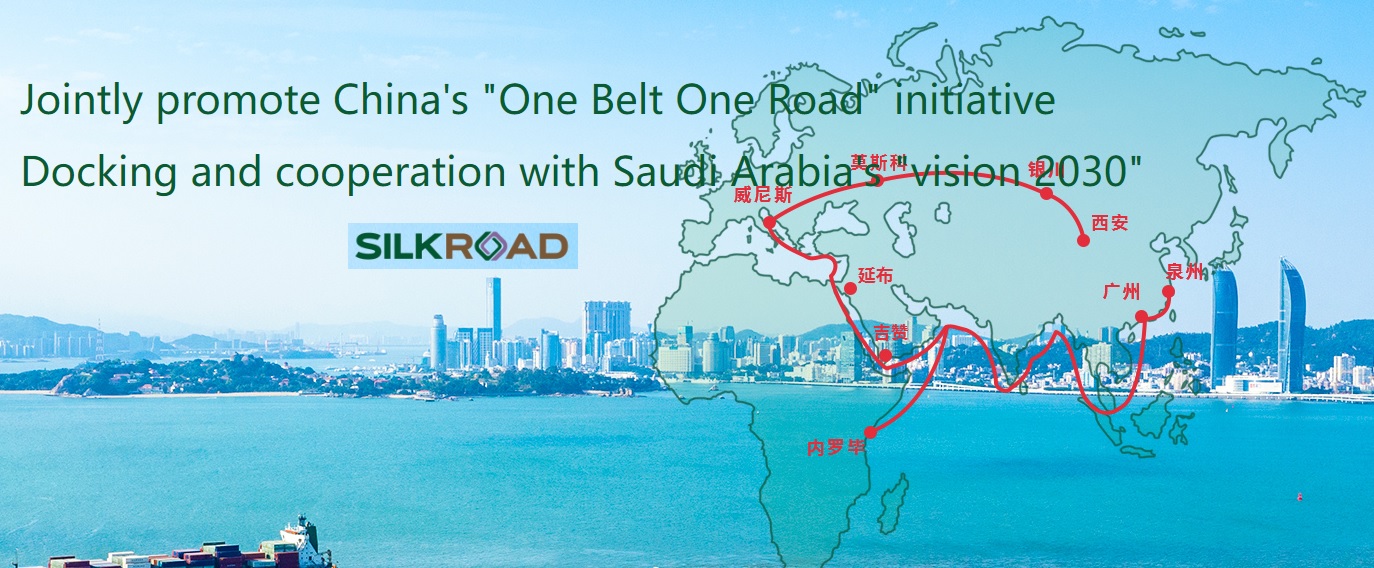
Project Scope:
Allocate area for multi waste management companies work in the cities to deal with waste from industry either as recycling or waste treatment.
Added Value:
- Minimize landfill usage and enforce recycling.
- Required special expertise and technology.
- Potential opportunity for PPP participation.
Project Scope:
JV with SABIC (58%) , Vopak (22%) and JABEEN (20%) to operate 71 tanks with total Capacity 568 k m3 to serve Petrochemical complexes in Jubail.
Added Value:
- Strategic partnership to enhance integration and efficiency and logistic performance index.
- Introduce the shared tank concept at the port side.

Project scope:
The Jazan Port for Primary and Downstream Industries will serve as the Kingdom of Saudi Arabia’s southern gateway to the rest of the world, as well as the primary gateway for logistics services, in line with the goals of Saudi Vision 2030 to transform Saudi Arabia into a leading industrial power and a global logistics hub, as well as attract international investment. Hutchison, the international port operator, has been contracted for 40 years (through a revenue-sharing model) to operate, invest in, and develop Jazan Port (including the procurement of equipment and maintenance).
Added Value:
- Attract international experience in port operation
- Enhancing logistic performance index
- Integration and efficiency of port operation
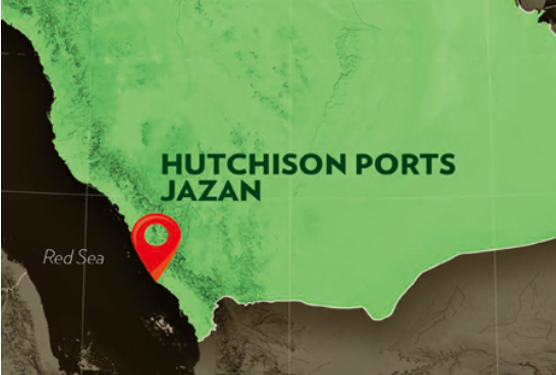
Project Scope:
Providing water cooling/air conditioning services to tenants in Royal Commission cities.
Added Value:
- Support district cooling initiatives in RCJY Cities.
- Improve the sustainability by reducing power consumption of cooling loads.
- Support city center services profile.
Project Scope:
To allocate evaporation pond for industrial wastewater that does not meet Marafiq.
Added Value:
- Low-cost treatment of wastewater.
- Special skills and capabilities.
- Execute future expansion if required.
Project Scope:
The Yanbu Tank Farm (near the port) is a facility containing large tanks dedicated to storing oil, petroleum, and petrochemicals before they are shipped to end consumers. The tank farm concept creates a potential development for public-private partnerships in shared storage tanks.
Added Value:
- Enhance integration, efficiency and logistic performance index.
- Introduce the shared tank concept at the port side.
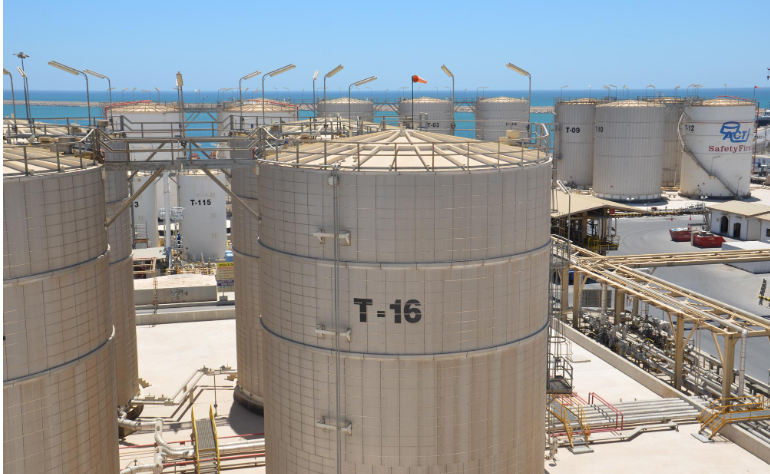
Project Scope:
Construction of an integrated non-hazardous waste complex and finding a national solution to mineral waste and Expansion of hazardous industrial waste infrastructure.
Added Value:
• Creating investment opportunities and improving the quality of life and the environment.
• Increasing recycling.
• Reducing toxic gas emissions.
• Power generation (waste-to-energy conversion).

